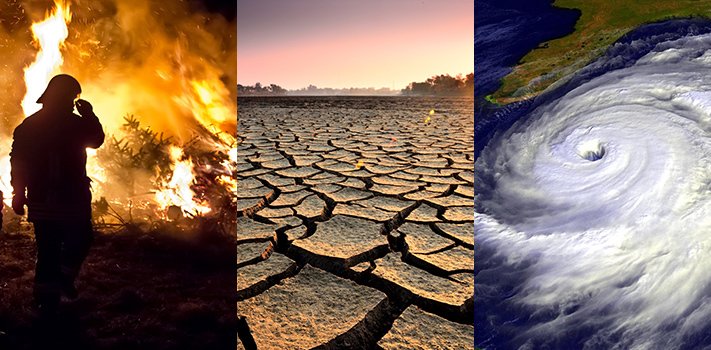CLIMATE CHANGE ACTION COULD AVOID FUTURE PANDEMICS
The Lancet Countdown’s fifth annual report presents most worrying outlook to date as key trends worsen
Healthcare systems are ill-prepared as extreme heat leads to fast-rising mortality worldwide and threatens livelihoods of millions
Heat-related deaths in the UK’s older population have more than doubled since the early 2000s
Tackling climate and pandemic crises in tandem can improve health of millions and save lives
Climate change could lead to global healthcare systems being overwhelmed in the same way they have been during the current Covid-19 pandemic, the authors of the latest world-leading report on climate and health have warned.
The 2020 Lancet Countdown report, produced by experts from around the world including the University of Reading, is urging urgent action on climate change to reduce the increasing threats to health, lives and livelihoods in all countries around the world – rich and poor.
The report shows a large rise in heat-related deaths and heatwave exposure among older people,
The authors call for a coordinated immediate response to climate change alongside the pandemic, in order to avoid future health crises, create a sustainable economy and protect the environment.
Professor Elizabeth Robinson, an environmental economist at the University of Reading, coordinates the first working group of the Report addressing the exposure and vulnerability of people to climate change.
Professor Robinson said: “The negative health impacts of global warming are clear and continue to worsen year on year. Yet we know that there are steps individuals, communities, and governments can take to reduce global warming that have immediate and local health benefits, in addition to longer-term global health benefits.
“Globally around 7 million people die each year from exposure to air pollution, specifically the fine particles that that can enter deep into the body and exacerbate pre-existing conditions such as heart disease and diabetes. We still allow more than 90% of children across the globe to breath toxic air each day, even though we know how dangerous this is, especially for the most vulnerable children such as those who have asthma.
“COVID-19 has reminded us of the value of clean air in our cities, but equally of the importance of actively managing a transition to a low-carbon economy, that enhances health, livelihoods, and economies. Reducing greenhouse gas emissions has the potential to improve global health now and in the future, and for governments to invest in jobs that enhance health and livelihoods.”
Key findings include:
A 54% increase in heat-related deaths in older people since 2000, with a record 2.9 billion additional days of heatwave exposure affecting over-65s in 2019 – almost twice the previous high.
Heat-related mortality among vulnerable people is growing globally, with 296,000 lives claimed in 2018.
Livelihoods are also at risk, as reduced ability to work outdoors due to heat has resulted in a loss of productivity in developing regions, with India accounting for 40% of the total 302 billion work hours lost.
UK heat-related deaths in the over-65s have more than doubled since the early 2000s to 8,500 in 2018. The economic cost of this mortality was the equivalent of 1.29% of the UK’s Gross National Income.
Heat and drought have driven increases in exposure to wildfires in 128 countries, with the USA seeing one of the largest rises.
Projected sea level rise could threaten the displacement of up to 565 million people around the world.
Air pollution from burning fossil fuels is causing 7 million deaths every year, with an estimated 17,700 deaths in the UK in 2018.
Healthcare capacity to deal with these future health shocks is inadequate. Only half the countries surveyed have national health and climate plans, with just four reporting adequate national funding, and two thirds of global cities expect climate change to seriously compromise public health infrastructure.
yield potential for the world’s major crops has declined by 1.8 – 5.6% from 1981 to the present day.
Action to tackle climate change could also protect against future pandemics by reducing the risk of infectious diseases jumping from animals to humans, and lowering transmission of illnesses like dengue fever and malaria.
The Lancet Countdown is a collaboration between experts from more than 35 institutions, including the World Health Organisation (WHO). It was published on the fifth anniversary of the Paris Agreement (2 December), which saw world leaders pledge to limit global warming to well below 2°C.
The report also highlights positive action that has been taken to mitigate climate change. In Europe, modest steps to promote cleaner energy and transport sectors and improve air quality have resulted in a significant reduction in deaths and could be worth an estimated US$8.8bn every year.
Dr Ian Hamilton, executive director of the Lancet Countdown, said: “The pandemic has shown us that when health is threatened on a global scale, our economies and ways of life can come to a standstill. The threats to human health are multiplying and intensifying due to climate change, and unless we change course our healthcare systems are at risk of being overwhelmed in the future.
“This year’s devastating US wildfires and tropical storms in the Caribbean and Pacific, coinciding with the pandemic, have tragically illustrated that the world doesn’t have the luxury of dealing with one crisis at a time.”

